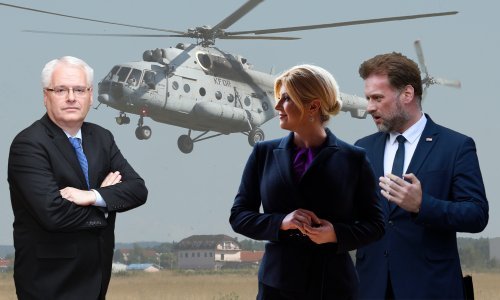The presidents of Croatia and Serbia, Ivo Josipovic and Boris Tadic, said after a working meeting in the northern Croatian Adriatic resort of Opatija on Wednesday that the genocide lawsuits the two countries had filed against one another with the International Court of Justice in The Hague could be settled out of court.
"An out-of-court settlement would be good in that dispute, which does not mean that we would drop prosecution of those who committed crimes. All who committed crimes have to answer for them," Tadic told reporters after the talks with Josipovic.
"We are willing to work on a compromise solution that would not annul the principles of justice and equity," Tadic added.
President Josipovic said that the lawsuit was not an end in itself. "If a settlement is possible in issues that are the subject of the lawsuit, it would render the lawsuit pointless," Josipovic said.
The two presidents described their first meeting since Josipovic took office in February as constructive and affirming a new course in the European partnership of Croatia and Serbia.
"There are many outstanding issues, some are easy to solve, some aren't. It is important that we have agreed on the principles of how they should be solved," Tadic said.
Josipovic said that after today's meeting in Opatija, he would frequently meet with Tadic and that he believed other state institutions, notably the two countries' governments, would cooperate in the same spirit.
He added that he was confident that the Croatian government would give Croatian translations of the EU acquis communautaire to Serbia, the same way it gave those translations to other countries in the region at a recent regional summit at Brdo Pri Kranju in Slovenia.
When asked to comment on Bosnian Serb Prime Minister Milorad Dodik's statement that the time had come to discuss a peaceful break-up of Bosnia-Herzegovina, both presidents expressed support for the territorial integrity of Bosnia-Herzegovina and a consensual solution agreed on by its three peoples on the future functioning of the joint state.
"I have been more than clear. Serbia opposes, both in principle and practically, any division of Bosnia-Herzegovina. The country's integrity must not be questioned," Tadic said, adding that Serbia and Croatia would accept any solution agreed on by legitimate representatives of Bosnia's peoples and citizens.
"The Dayton peace agreement and the entities in Bosnia-Herzegovina, just like the future of all peoples in the country, must not be questioned by anyone," Tadic was categorical.
Josipovic added that he supported the policy of equality of all three peoples and of every individual throughout Bosnia-Herzegovina's territory.
"The three peoples will decide about their future, and we are here to help them with good advice, negotiating services, and European values which we will advocate for Bosnia-Herzegovina," the Croatian president said.
The Serbian president, who symbolically called himself this season's first Serbian tourist on the Croatian coast, called on Serbian citizens to spend their holidays in Croatia and on Croatians to visit Serbia, saying that they were welcome in both countries and that tourism was a way of overcoming prejudices from the past.
"Serbia does not have a covert policy towards Croatia, Bosnia-Herzegovina or Southeast Europe. Serbia has a single policy which is well known and with which I acquainted President Josipovic today," Tadic said.
The two presidents said the only issue they did not agree on today was the outcome of a Davis Cup match between Croatia and Serbia, to be held in Split soon.
"I believe that someone will solve that problem in our stead. I believe it will be Novak Djokovic," Tadic said, to which Josipovic replied that as a better arbiter, he believed that Ivan Ljubicic would win.
The two presidents met today in a bid to resume talks at the top level and defuse tensions in bilateral relations.
Relations between Croatia and Serbia have deteriorated since Croatia's recognition of Kosovo's independence, and Tadic's nonattendance at Josipovic's inauguration in Zagreb last month capped this deterioration.
According to sources from the Office of the Croatian President, holding talks in Opatija had been proposed by both countries and both presidents wanted the meeting to sort out problems stemming from the disintegration of the former Yugoslav federation such as border disputes, refugees and treatment of national minorities.
Josipovic and Tadic will presumably attend an international conference in Brussels later this week and they wanted to hold a bilateral meeting before their possible talks on the margins of that conference.
The news about their meeting in Opatija was welcomed by the European Union and its member-states. Brussels has not exerted any influence or facilitated the organisation of the Opatija talks, a source from Josipovic's office said.
The talks were organised in co-ordination with the Croatian government and Opatija was chosen as the venue to give a more informal feeling to the event.


































